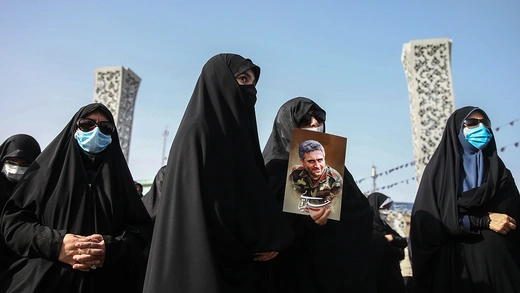Three Challenges That Are Testing Iran’s Regime
Iran is facing international pressure over its nuclear program and assassinations of top officials. Meanwhile, its move to lift subsidies could stir public revolt.
By experts and staff
- Published
Experts
![]() By Ray TakeyhHasib J. Sabbagh Senior Fellow for Middle East Studies
By Ray TakeyhHasib J. Sabbagh Senior Fellow for Middle East Studies
It has been a year since Ebrahim Raisi’s election as president of Iran, which is grappling with a weak and failing economy, stalled diplomacy over the nuclear deal, and resurgent security threats in the form of targeted assassinations. It’s another round of towering challenges for an Iranian regime that seems intent on hard-line crackdowns on domestic protests and has shown an ability to muddle along on foreign policy.
1. Protests over food prices
The Raisi administration is undertaking what it refers to as “economic surgery” to deal with a budget deficit in the tens of billions of dollars and annual inflation running at 40 percent. This effort is not only meant to deal with current economic problems driven in part by U.S.-led sanctions over its nuclear program and its regional activities; it’s also an attempt to address a subsidy issue that has plagued Iran’s economy for decades. The Islamic Republic is a vast welfare state that subsidizes not just basic food stuffs but critical sectors such as health care and education. Raisi seems intent to move on this front, reducing subsidies on products such as wheat and flour even amid grain shortages caused by the Russian invasion of Ukraine. The Raisi administration has insisted from the beginning that it will not wait for a revived nuclear deal to address economic shortcomings.
The price for doing this has been protests throughout the country, as the cost of a kilo of flour has in some places risen sixfold. Prices have also soared for staples such as cooking oil, chicken, eggs, and milk. As often happens in Iran, economic grievances turn political very fast and chants of “death to Khamenei” (referring to longtime Supreme Leader Ali Khamenei) and increasingly “death to Raisi” are echoing in the streets. The government seems confident that its security forces can handle these protests and has been ruthless in its suppression. So far, this strategy has been effective, but the more Raisi trims Iran’s subsidies, the greater risk of demonstrations getting out of hand. Iran could be in for a long, hot summer.
2. Stalled nuclear talks
The attempt to revive the nuclear deal, the Joint Comprehensive Plan of Action (JCPOA), is still at an impasse. Although all the parties have reported progress on critical nuclear and sanctions issues, the U.S. listing of the Islamic Revolutionary Guard Corps (IRGC) as a Foreign Terrorist Organization appears intractable. Neither Iran nor the United States seems prepared to budge on this issue: The United States insists that the designation is outside the terms of the deal, while Iran stresses that the designation was made by the Donald Trump administration to pressure Iran on the nuclear front and thus its removal has to be part of the relief package.
In the meantime, the International Atomic Energy Agency, the UN nuclear agency, has leveled unusually sharp criticism at Iran for its lack of cooperation on developments in its nuclear program. The agency claims that Iran has yet to give clear answers to questions regarding traces of enriched uranium found at three different locations. Iran has dismissed the accusations as fabrications. Given Iran’s lack of cooperation, the United States, France, Germany, and United Kingdom have introduced a resolution at the IAEA’s Board of Governors censuring Iran. This is likely to prolong the stalemate. The IAEA reported a sharp increase in Iran’s supplies of enriched uranium, moving it closer to being able to make a nuclear bomb. Some arms control experts say Iran is only months away from this capability, though the regime insists it has no plans to develop nuclear arms.
3. Targeted assassinations
On May 22, Colonel Hassan Sayyad Khodaei, an IRGC officer, was killed outside his office by two gunmen on motorcycle. Iranian authorities have pointed the finger at Israel, which is thought to have conducted such operations against Iran’s nuclear scientists in the past. Iran and Israel have also been involved in direct military conflicts in Syria, where Israel is determined to prevent Iran from constructing permanent military decampments.

If Israel was behind it, Khodaei’s killing would mark the first time that Israel targeted an Iranian official in Tehran who had no ties to the nuclear program. Khodaei is said to have been involved in operations against Israel with ties to Palestinian militants. This is a potentially serious escalation, as Israel could be telling Iran that its ties to various terrorist organizations is a basis for targeted killings of its officials.
The Raisi government’s approach has been to rely on security services to handle the domestic protests. The regime seems confident that the domestic and diplomatic turmoil it faces is still manageable and that it can afford to rely on repression.
